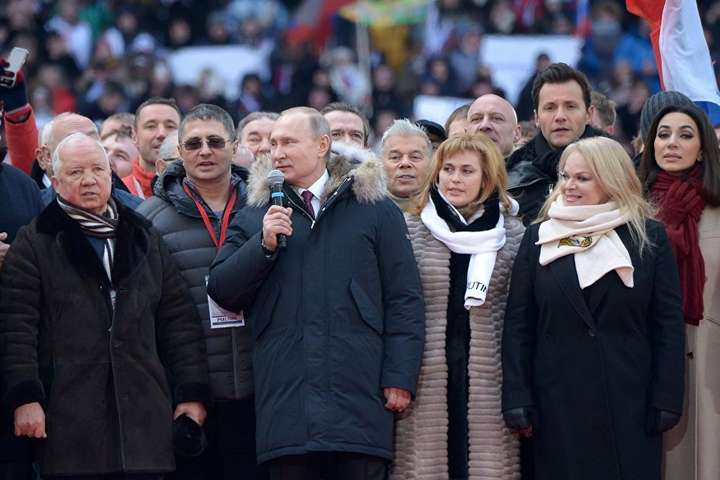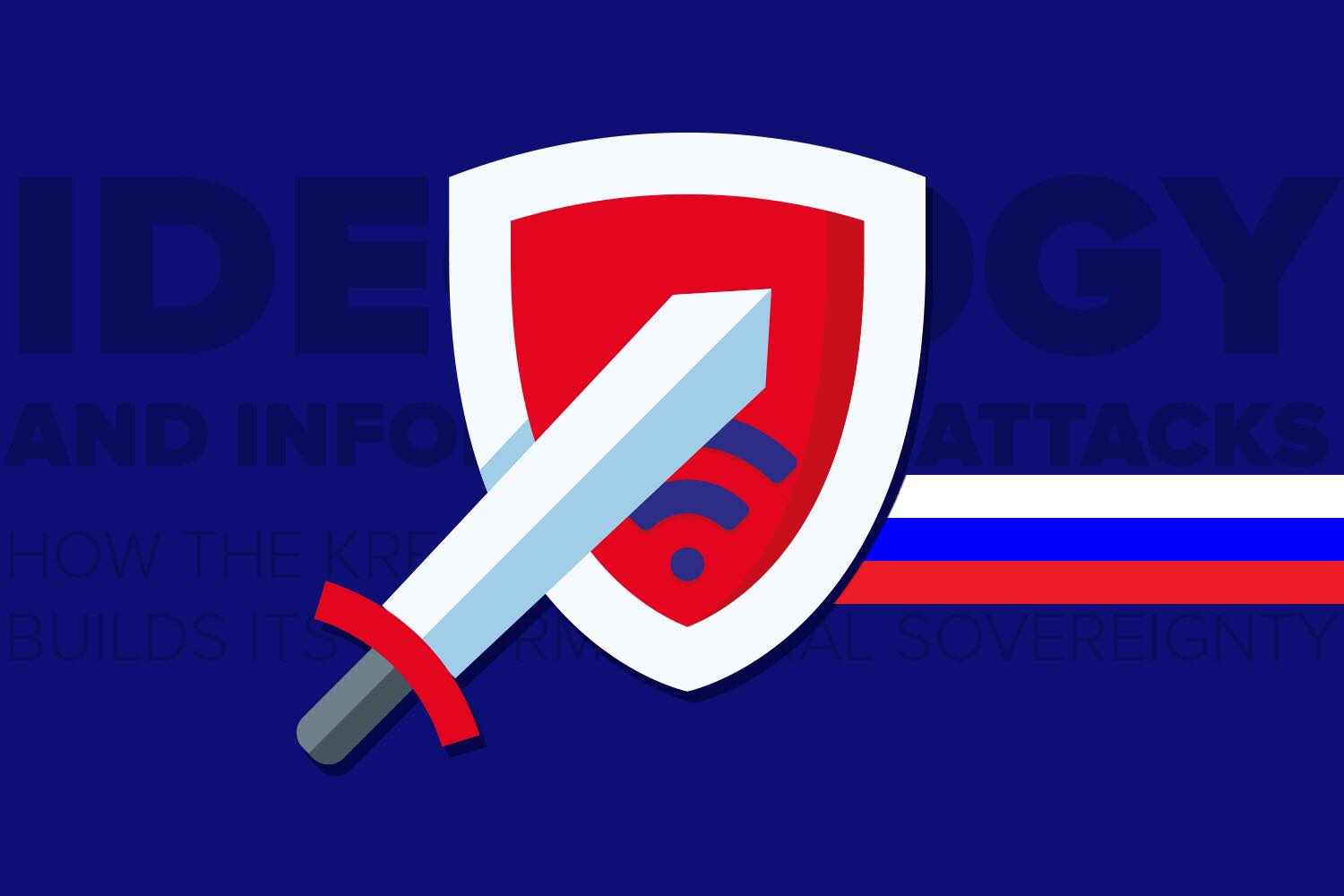Any government "can justify armed intervention in a foreign state" through information attacks, and prevent such attacks against itself with the help of ideology. This is the doctrine of Igor Ashmanov, who developed the concept of "information sovereignty of the Russian Federation."
Who is this Ashmanov?

Igor Ashmanov is one of the most famous managers of Runet, or the Russian-language community on the Internet, and husband of Natalia Kaspersky, President of the InfoWatch Group of companies and co-founder and ex-CEO of the Russian antivirus security software company Kaspersky Lab.
He is currently Putin's trustee during the Russian presidential campaign. During the rally ahead of voting in the presidential election, Ashmanov said:
“We are a warring country, make no mistake. He (Putin) collects territories, wins wars, and introduces new weapons. How can a warring country change its commander-in-chief?”
In Russian media, Ashmanov is referred to as the "ideologist of the Russian Information Security Doctrine," which was adopted in 2016.
In his interviews and articles, Ashmanov speaks about informational “vbrosy” (controversial posts in social media engineered to divert attention), mental viruses, and memory erosion. Back in 2012, he tested out "vbrosy" about the Patriarch of the Russian Orthodox Church, explaining how this rapid spreading of rumors and falsities differs from regular news, and the algebra of how it can develop into news, shaping the audience’s perception of the world.
“Vbrosy” can provoke the spread of false information at a crazy speed in huge volumes, igniting people's emotions. And then this information fades and is quickly forgotten.
The USA’s “information war” against the West and Russia?
Igor Ashmanov is a supporter of conspiracy theories which are extremely popular in Russia even among critically minded people. One of them is the belief that freedom of speech breaks the sovereignty of nations, and its aim is to create a world government with a center in Washington.
In his view, freedom of speech is a pro-Western instrument used by the liberals to prevent states from building their “informational sovereignty.” At the same time, freedom of speech is a means of “US information war against other countries,” as it allows foreign content to penetrate the information space of these countries.
At the same time, Western states do not possess “informational sovereignty” at all because it is incompatible with the processes of globalization.
Russia, "on guard for the system of international law"

According to Igor Ashmanov, globalization and, to some extent, human rights culture "breaks down sovereignty and the entire system of international law."
On the contrary, "informational sovereignty” is beneficial to states that want to pursue their policies disregarding the international community: "If you do not have informational sovereignty, you may lose ordinary sovereignty, that is, to cease to be an independent state."
He predicts that the Internet will collapse into “many sovereign Internets," when each state will “nationalize” its Internet in order to be able to filter it according to its national security system.
And according to this perspective, smaller states will need to cooperate with large ones – the superpowers. So, according to him, Russia cannot abandon the status of a superpower, because "it is too big and it has too many nuclear weapons." In his opinion, small countries will not be able to build full “informational sovereignty,” so such countries can unite with Russia.
Creating ideologies to protect sovereignty

During IForum-2013, the largest internet conference in Ukraine, Igor Ashmanov told that, in order to maintain full independence, governments should control the flow of information within its borders by creating propaganda and information war systems. Since, according to him, "sovereignty is being broken by foreign powers primarily through the dissemination of information, and then through the ‘substitution of ideology’,” governments must propose an ideology to its citizens, and this ideology should be the core of "informational sovereignty.” To protect it, the government must create an "information shield" and an "information sword."
Information defense
According to Ashmanov, an "information shield" can protect information from external interference. To create one, the state should ensure a complete technological chain to create and enable the flow of information within the country.
Elements of the shield include:
- a high level of computerization of the country and information and communication turnover; national software and antiviruses;
- a strong domestic and international positive image of the country;
- a clear national idea (ideology) to unite a large number of people for one purpose;
- a national Internet infrastructure (search engines and social networks);
- legislation;
- national payment systems.
Information attacks
The “information sword” concept envisions attacks that actively or preventively interfere in the information flows of foreign states, aiming to "undermine the informational sovereignty of the enemy."
Elements of the sword include:
- creating propaganda and media systems, including channels of external communication;
- producing and promoting national cultural products such as movies, music, national brands that can be used in particular to undermine the legitimacy of the government in certain countries, in particular through commercials, documentaries, films, and pseudo-documentaries;
- distributing the necessary state ideas on the internet through news, social networks, Wikipedia, etc;
- promoting a positive image of the country through the Internet and mass culture and negativizing the image of the enemy states and undermining their international credibility;
- Institutionalizing the information sphere through creating a hierarchy of bodies of informational influence (ministries, departments, cyber troops);
- Creating legislation as a mechanism for a rapid response to attempts to undermine informational sovereignty, for example, sanctions against hackers and instigators of revolutions, as well as restriction of distribution of unfavorable government content etc.
Examples of the "shield and sword" in Russian information policy
Parallels between Ashmanov’s "shield and sword" and Russian information activities are obvious. In its light, the ideas of the "Russian world" and "Great Russia," as well as propaganda through concerts, political shows, the international information services Russia Today and Sputnik, social networks, fake news etc. come together into a single strategy.
Also, Putin’s adviser German Klimenko has stated that Russia is “ready to be cut off from the internet because it has its own web,” testifying to the country’s ambitions to create an isolated information system.
Recent statements by foreign leaders regarding Russia's informational influence on their internal processes, journalist investigations and think tank publications suggest that the Kremlin has implemented elements of an "information sword." It has adopted information tools to interfere in the affairs of states which don’t possess such "informational sovereignty." Which would be all European states.
This interference is possible due to information attacks not being prohibited by international law, with a few exceptions.
At the same time, Ashmanov said the same laws that apply to abuses in real life should be applied the information sphere. It is difficult not to agree with the "guru" of informational influence. States should agree among themselves on the international legal regulations of information attacks. In fact, this is long overdue, given that Russia’s hostile information operations abroad have been discussed for several years in a row.
Thus, the concept of “informational sovereignty” epitomizes the double standards of the Russian approach – “saving its own sovereignty” at the cost of the sovereignty of other states, by interfering in their internal affairs.
This means that sovereignty as such is not a value for Russia. Its “sword and shield” is all about a one-sided justification of interferences playing into the interests of one state that does not want to abide by international law and human rights standards – the Russian Federation.

More about the strategies of Russian propaganda here:
- A guide to Russian propaganda
- Part 1: Propaganda prepares Russia for war
- Part 2: Whataboutism
- Part 3: Rapid fire conspiracy theories
- Part 4: Russian propaganda operates by law of war

